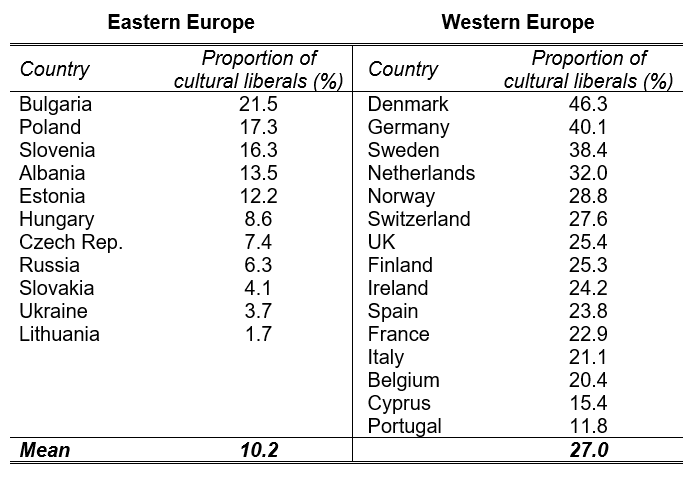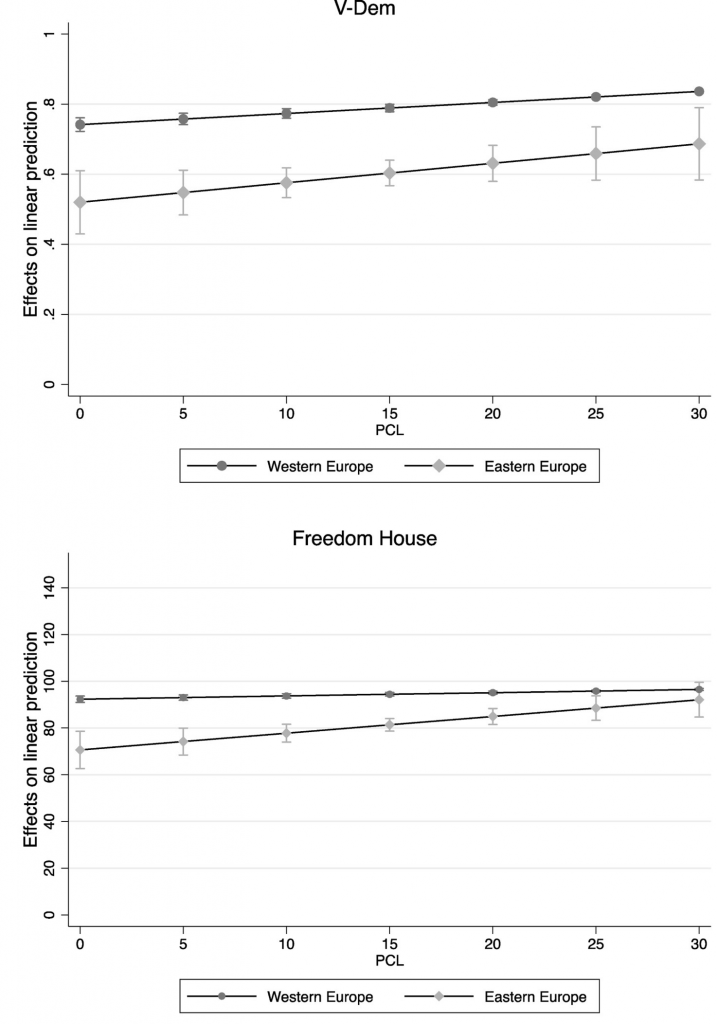Why are some countries in Europe more susceptible to democratic backsliding than others? Drawing on new research, James Dawson and Aurelia Ananda illustrate that the proportion of ‘cultural liberals’ within a national population has an important impact on democracy levels and resistance to backsliding.
Following the global financial crisis and the related wave of ‘illiberal populism’, all European democracies have been ‘stress-tested’ over the past decade. However, institutional erosion has occurred mainly in eastern Europe. Several qualitative analyses have claimed that weak support for progressive dimensions of liberalism explains this democratic vulnerability. To explore whether quantitative support may be found for this thesis, we set about constructing a measure of cultural support for liberalism that starts from advances in democratic theory.
We conceptualise cultural liberals as ‘supporters of the new social movements’, noting that many of these causes – ethnic and sexual minority rights in particular – have subsequently been codified as part of the liberal democratic template. In identifying cultural liberals in this way, we are inspired by the West German student protesters who succeeded from 1968 onwards in expanding the parameters of democratic politics in an emancipatory direction despite not forming an electoral majority.
In theoretical terms, the West German protesters are analogous to other historical instances in which ‘oppositional counterpublics’, often representing marginalised social groups such as ‘women, workers, and people of colour’, successfully drove the expansion of the public sphere. Extending this logic, we wager that the antidote to democratic backsliding in Post-Communist Europe – and in the longer term, the route to a more liberal democracy in the cultural sense – runs through the emergence of culturally liberal counterpublics that challenge the often tacitly illiberal discourses that occupy the (often ‘pro-European’) political mainstream.
We use six items from the European Social Survey to identify individuals as ‘cultural liberals’. Five of these items – protection of LGBT (1) and minority rights (2), protection of opposition (3) and media freedom (4), and support for the court’s role as a checking mechanism against governments (5) – were chosen so as to demonstrate support for those potentially anti-majoritarian liberal institutional norms most likely to lapse.
By insisting on emphatic support for each of these norms to qualify as a cultural liberal, which is to say fulfilment of all criteria rather than using the items to generate means, we guard against the likelihood that cultural liberals’ support for democracy melts away when it is needed most. Given this imperative for mobilisation-readiness, the sixth ESS item that completes our criteria is ‘interest in politics’, which we use as our ‘activity’ filter.
Table 1: Cultural liberals in European countries as a percentage of total population
Note: For more information, see the authors’ accompanying paper in the Journal of European Public Policy.
To address our research question, we hypothesised that the higher the proportion of cultural liberals in a national population, the greater the rise in democracy levels and resistance to democratic backsliding would be. In other words, we expected that liberal counterpublics would serve as anchors of democracy, providing a degree of upward pressure on democracy levels in rough proportion to their size. We also expected that the proportion of cultural liberals would exert a stronger positive effect on democracy levels in the newer and more volatile democracies of eastern Europe.
Our findings confirm our expectation that culturally liberal counterpublics aid the durability of democratic institutions across Europe. According to this model, and in opposition to a political science orthodoxy stressing the perils of polarisation, it may be the culturally liberal ‘counterpublic’ that both makes and keeps liberal democracy ‘liberal’ in the ‘advanced democracies’ in our study like Denmark, Germany and, to a lesser extent, the UK.
We also found that a higher proportion of cultural liberals in a population more substantially increases democracy levels in eastern relative to western Europe, as demonstrated by Figure 1. While the proportion of cultural liberals has an overall positive effect on increasing democratic levels in both eastern and western Europe, this effect is larger in eastern Europe, affirming the critical role that cultural liberals have in newer democracies. If the earlier and now largely lapsed wave of democratisation in Post-Communist Europe was driven more by a technocratic will to reform aimed primarily at EU accession, it appears that hope may now be springing from those who favour an altogether more ambitious and emancipatory conception of liberal democracy.
Figure 1: Linear prediction of the effect of the proportion of cultural liberals on democracy scores in eastern and western Europe
Note: Models control for economic inequality, GDP per capita, and levels of corruption (Quality of Governance data 2012-2021). Confidence intervals are 95%. For more information, see the authors’ accompanying paper in the Journal of European Public Policy.
For democrats in Post-Communist Europe then, there is bad news and good. First, our results suggest that the democracy gap between eastern and western Europe is likely to continue to widen. The proportion of cultural liberals in eastern Europe is considerably lower than in western Europe, a disparity that is unlikely to change rapidly. Our model therefore suggests that the unravelling of liberal institutions probably has some years yet to run.
Looking further ahead, however, we are heartened by the fact that progressive street-based mobilisations have taken place with increasing regularity across the region since the early 2010s. Bulgaria experienced multiple waves in 2013-14 and again in 2020-21. Poland, which continues to experience democratic backsliding under the religious-right Law and Justice Party, is also now notable for the visibility of its proudly feminist opposition. These movements are analogous in attitude if not yet in scale to the West German student protesters of 1968.
For more information, see the authors’ accompanying paper in the Journal of European Public Policy
Note: This article gives the views of the authors, not the position of EUROPP – European Politics and Policy or the London School of Economics. Featured image credit: CC-BY-4.0: © European Union 2022– Source: EP







